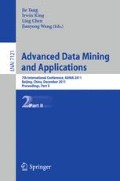Abstract
In independent cascade model, an active node has only one chance to activate its neighbors, while in reality an active node has many chances to activate its neighbors. We propose an influence diffusion model called multiple spread model, in which an active node has many activation chances. We prove that influence maximizing problem with the proposed model is submodular and monotone, which means greedy algorithm provides (1-1/e) approximation to optimal solution. However, computation time costs much due to Monte Carlo simulation in greedy algorithm. We propose a two-phase method which leverages community information to find seeds. In order to evaluate influence of a particular node, we also propose a definition of local influenced community as well as an algorithm called LICD to detect local influenced community. Experiments show that the proposed model and algorithms are both efficient and effective in problems of influence maximizing and local influenced community detection.
Access this chapter
Tax calculation will be finalised at checkout
Purchases are for personal use only
Preview
Unable to display preview. Download preview PDF.
References
Goldenberg, B.L.J., Muller, E.: Talk of the network: A complex systems look at the underlying process of word-of-mouth. Marketing Letters 12(3), 211–223 (2001)
Fortunato, S.: Community detection in graphs. Physics Reports 486, 75–174 (2010)
Newman, M.E.J.: Fast algorithm for detecting community structure in networks. Physical Review (2004)
David Kempe, J.K., Tardos, E.: Maximizing the Spread of Influence through a Social Network. In: KDD, Washington, DC, USA (2003)
Kimura, M., Saito, K.: Tractable Models for Information Diffusion in Social Networks. In: Fürnkranz, J., Scheffer, T., Spiliopoulou, M. (eds.) PKDD 2006. LNCS (LNAI), vol. 4213, pp. 259–271. Springer, Heidelberg (2006)
Jure Leskovec, A.K., Guestrin, C., Faloutsos, C., VanBriesen, J., Glance, N.: Cost-effective Outbreak Detection in Networks. In: KDD (2007)
Wei Chen, Y.W., Yang, S.: Efficient Influence Maximization in Social Networks. In: KDD, Paris, France (2009)
Narayanam, Y.N.R.: A shapley value based approach to discover influential nodes in social networks. IEEE Transactions on Automation Science and Engineering (2010)
Wei Chen, A.C., Cummings, R., Ke, T., Liu, Z., Rincon, D., Sun, X., Wang, Y., Wei, W., Yuan, Y.: Influence Maximization in Social Networks When Negative Opinions May Emerge and Propagate. Microsoft Research Technical Report (2010)
Clauset, A.: Finding local community structure in networks. Physical Review 72(2), 26132 (2005)
Luo, J.W.F., Promislow, E.: Exploring local community structures in large networks. Web Intelligence and Agent System 6(4), 387–400 (2006)
Bagrow, J.: Evaluating local community methods in networks. Journal Statistical Mechanics 2008(05), 5001 (2008)
Zaïane, O., Chen, J., Goebel, R.: Local community identification in social networks. In: Proceedings of the International Conference on Advances in Social Networks Analysis and Mining (ASONAM), Athens, Greece (2009)
Branting, L.K.: Incremental detection of local community structure. In: International Conference on Advances in Social Network Analysis and Mining, Los Alamitos, CA, USA (2010)
Nemhauser, L.W.G., Fisher, M.: An analysis of the approximations for maximizing submodular set functions. Mathematical Programming 14, 265–294 (1978)
Inderjit, Y.G., Dhillon, S., Kulis, B.: Kernel kmeans, Spectral Clustering and Normalized Cuts. In: KDD (2004)
Lancichinetti, A., Fortunato, S.: Community detection algorithms: a comparative analysis. Physcal. Review. E 80, 56117 (2009)
Ma, H., Yang, H., Lyu, M.R., King, I.: Mining social networks using heat diffusion processes for marketing candidates selection. In: Intelligent Hypertext (2008)
Author information
Authors and Affiliations
Editor information
Editors and Affiliations
Rights and permissions
Copyright information
© 2011 Springer-Verlag Berlin Heidelberg
About this paper
Cite this paper
Yan, Q., Guo, S., Yang, D. (2011). Influence Maximizing and Local Influenced Community Detection Based on Multiple Spread Model. In: Tang, J., King, I., Chen, L., Wang, J. (eds) Advanced Data Mining and Applications. ADMA 2011. Lecture Notes in Computer Science(), vol 7121. Springer, Berlin, Heidelberg. https://doi.org/10.1007/978-3-642-25856-5_7
Download citation
DOI: https://doi.org/10.1007/978-3-642-25856-5_7
Publisher Name: Springer, Berlin, Heidelberg
Print ISBN: 978-3-642-25855-8
Online ISBN: 978-3-642-25856-5
eBook Packages: Computer ScienceComputer Science (R0)

